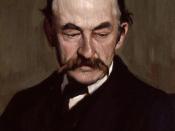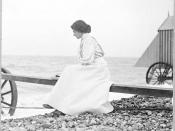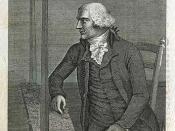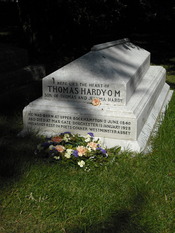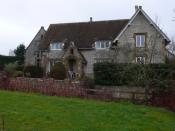"The Darkling Thrush: Out with the Old and in with the Boo-hoo"Humans immune to passion living as though already dead, the bustling Industrial Revolution shoving countryside comfort out the door and a grim glimmer of hope for the turn of the century; sounds like a promising poem eh? Thomas Hardy's "The Darkling Thrush" represents the change brought about by the Industrial Revolution characteristic of the literature produced during the Victorian era. Atomization, despair, and nostalgia for life before the Industrial Revolution reflect the themes of the Victorian era in literature. Weary of what the new century will bring in as the Victorian age comes to a close Hardy reflects the concerns of many people of the era. Hardy's poem "The Darkling Thrush" portrays nostalgia for the rural countryside, dark misgivings towards humanity as a result of Hardy's own personal experiences, a shimmer of hope for the twentieth century, and an unshakeable feeling of isolation.
Looking around at the dying rural culture, Hardy realizes it is time to say good-bye to the fading country customs. "The land's sharp features seemed to me/ The Century's corpse outleant/ His crypt the cloudy canopy/ The wind its death-lament." By comparing the pastoral lifestyle to a corpse Hardy implies that like all things human, it too must die. Railroads and other industrial inventions were changing towns all over England and soon these changes would reach his little town. People were already flocking to cities to work, abandoning the country leaving it desolate and extinct. As the man in the poem looks around he sees the death of older customs and lifestyles. The phrase a "weakening eye" personifies the nineteenth century and its struggle to fight off its own decline, attempting to keep its "eye" (or traditions) open a bit longer. Hardy was torn between accepting new culture and wanting to remain in touch with his roots. However, the depressing connotation reflects a duality in his morbid connection to nature and longing for that same nature to rejuvenate itself. He may not be ready to let it go but he recognizes he must lie to rest that lifestyle to better accept the new coming traditions.
Hardy chooses his words carefully using negative words such as "gray," "desolate," "broken" and "haunted" which reflect Hardy's own attitudes toward life. After losing his friend Horace Moule to suicide in 1873, his works turned into tragedies. This traumatizing experience cast a dark shadow on Hardy's view of humanity. This attitude is portrayed in the lines "All mankind that haunted nigh, / Had sought their household fires" and "every spirit on the earth, seemed fervourless as I." Hardy believes many people, much like himself, live empty and bleak lives and so must seek their "household fires" in hopes that somehow the life of nature, a wild and untamed fire, will ignite their own lives into feeling, even if that feeling is merely heat. When referring to them as "spirits" he is already implying they are dead. Living alienated lives in which people seek their own fires reflects the atomization characteristic of Victorian works. The isolated people relate to Hardy because they too feel sorrow for the pains of life. Just like Hardy, they are anxious as to what the new century will entail.
Hardy describes the new century as a possible jump start needed to rekindle passion and life into the monotonous lives of the people of the era. The appearance of a songbird in stanza three offers hope that the turn of the century may act as a savior of humanity, rescuing the world from their empty lives. While the poem is set during winter months in which flowers die, rivers freeze up, and the chill of the air forces nature to quiet itself, the fact that winter is a season, a temporary period in time, denotes it will not last forever. Spring will come again restoring life. Rather than dreading the new year, the people described may be dreading their current state and hope the new century will prove to wash them of their current sorrows and empty lives. The new century would act as a re-birth, much like spring acts as a re-birth to nature. Just as spring restores life to the sleeping wilderness, the new century will awaken the passion buried inside those coming out of the dreary life during the Victorian Age. Hardy's poem poses the question of whether or not the 20th century will be better than the 19th century. Should mankind wait in anticipation or dread? The song of the thrush instills a small hope into the suffering hearts if humanity.
However, after recognizing this small hope, Hardy states he was "unaware" to the thrushes singing implying the hope is a false hope and he does not believe the turn of the century will make the world any better. Since technology had already brought isolation and despair, Hardy believed continuing advances would only further this trend. His misgivings towards the 20th century prove to be on point with the two world wars which ensue. I think Hardy hoped the new era in the world would return back to the days of simplicity, calmness, and quiet life on the farm. However, after the Industrial Revolution had already deadened much of mankind to feeling, God, and passion, the continuing advances in technology would only deepen the level of human suffering.
The unawareness reflects Hardy's feelings of isolation from society. While the rest of society is feeling a possible hope, Hardy is too distracted lamenting the past and the tragedies of his own life to recognize a possibility for hope. Instead, he has chose to "fling his soul/ Upon the growing gloom" acting much like the thrush in the poem only he sings of a lost hope whereas the thrush sings of possible hope. The fact that such a small amount of the poem discusses hope furthers the isolation, separating the fears for the future from the wishes for the future. While Hardy shares similar worries towards the incoming century as many others at the time, the atomization of society enforces the lonesome feelings within Hardy and others.
The speaker's despair echoes Hardy's own world-weariness and loss of hope for humanity's future. Although it's a little late, seven years to be exact, I find myself lamenting for days of the past as well. Times when I could get on a plane without having to go through two hours of security, times when I could watch the sunset without new houses blocking my view, and times when I spent Saturdays morning watching cartoons, eating cold cereal rather than typing insightful and eloquent essays which I hope will dazzle my professor's mind. The Victorian age in literature applies to all eras. People have times of loneliness in their lives, wishing for days when life was simpler and stress free, and not having to worry about the future. What makes Hardy a significant and 7lasting poet is his ability to take the depressing and vulnerable aspects of our lives, themes many don't wish to encounter very often, and acknowledge that while we may not be able to see a hope for the future, it doesn't mean it's not there.
Word Count: 1207Works CitedHarper, Douglas. "The Darkling Thrush." Brambles. 1 April 2007 "Thomas Hardy." Dictionary of Literary Biography, Volume 18: Victorian Novelists After 1885 (1983): 119-141.
